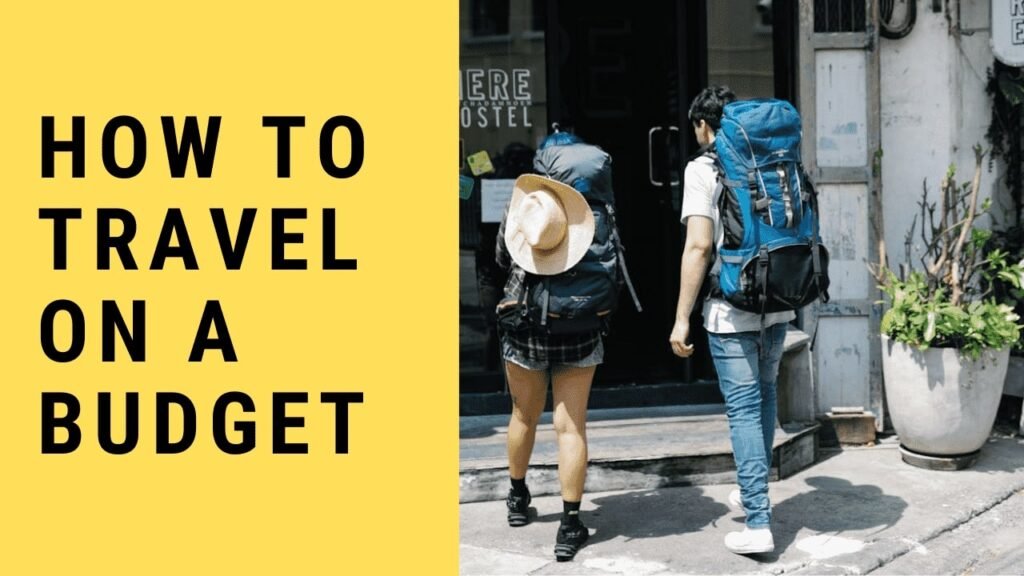Absolutely! Here are 20 points for how to travel on a budget:
1. Choose Budget-Friendly Destinations:

1) Research destinations where your money can stretch further. Look for countries with lower costs of living or regions with favorable exchange rates.
2) Consider traveling during off-peak seasons when prices for accommodations, attractions, and flights are typically lower.
3) Look into destinations where you can find a variety of budget-friendly activities, accommodations, and dining options.
2. Be Flexible with Travel Dates:

1) Use flexible date search tools on flight comparison websites to find the cheapest travel dates.
2) Avoid traveling during peak seasons, holidays, or weekends when prices are typically higher.
3) Consider traveling mid-week or during shoulder seasons to find better deals on flights and accommodations.
3. Use Fare Comparison Websites

1) Utilize websites like Skyscanner, Kayak, or Google Flights to compare prices from multiple airlines and booking platforms.
2) Set up price alerts to notify you when there are price drops for your desired destination and dates.
3) Be flexible with your departure and arrival airports to find the best deals
4. Explore Alternative Transportation:

1) Consider taking buses, trains, or ridesharing services instead of flying for shorter distances or within regions.
2) Look into multi-ride passes or discount cards for public transportation in your destination to save money on getting around.
3) Embrace slower modes of travel, like overnight buses or trains, which can also save you money on accommodation for the night.
5. Stay in Budget Accommodations:

1) Opt for budget-friendly accommodations such as hostels, guesthouses, or Airbnb rentals, especially if you’re traveling solo or with a small group.
2) Look for accommodations located away from tourist hotspots, as they tend to be cheaper and offer a more authentic local experience.
3) Take advantage of discounts and loyalty programs offered by booking platforms or specific accommodation providers.
6. Cook Your Own Meals:

1) Save money on dining out by cooking your own meals using kitchen facilities in hostels, guesthouses, or Airbnb rentals.
2) Shop at local markets or grocery stores to buy fresh ingredients and prepare your own meals, which can also give you a taste of the local cuisine.
3) Reserve dining out for special occasions or for trying local specialties that you can’t make yourself.
7. Pack Light:

1) Avoid extra baggage fees by packing light and only bringing the essentials.
2) Choose versatile clothing items that can be mixed and matched for different outfits to minimize the number of clothes you need to pack.
3) Consider doing laundry while traveling instead of bringing enough clothes for the entire trip.
8. Take Advantage of Free Attractions:

1) Research free or low-cost attractions in your destination, such as parks, museums with free admission days, or self-guided walking tours.
2) Look into city passes or discount cards that offer discounted or free entry to multiple attractions and activities.
3)Take advantage of free walking tours or explore neighborhoods on foot to soak up the local atmosphere without spending money.
9. Use Public Transportation:

1) Opt for public transportation like buses, subways, or trams instead of taxis or rental cars to save money on getting around.
2) Research transportation options in advance and plan your routes to minimize costs and travel time.
3) Consider purchasing multi-day or weekly passes for public transportation if you’ll be using it frequently during your stay.
10. Travel with a Group:

1) Splitting costs with friends or family members can significantly reduce expenses for accommodations, transportation, and even meals.
2) Look for group discounts or deals on activities or tours that you can take advantage of together.
3) Consider sharing supplies or equipment, such as tents or cooking gear, to further reduce costs on outdoor adventures.
11. Look for Travel Deals and Discounts:

1) Keep an eye out for travel deals, discount codes, and last-minute offers on accommodation, flights, and activities.
2) Subscribe to newsletters or follow travel deal websites and social media accounts to stay updated on the latest promotions.
3) Consider booking package deals or bundling flights and accommodations to save money on your overall travel costs.
12. Travel Off-Season:

1) Traveling during the off-peak season can result in lower prices for accommodations, attractions, and even flights.
2) Research the off-season for your desired destination and plan your trip accordingly to take advantage of reduced prices and fewer crowds.
3) Keep in mind that some attractions or services may have limited operating hours or be closed during the off-season, so be sure to check in advance.
13. Bargain and Negotiate:

1) Practice your bargaining skills, especially when shopping at local markets or booking tours or activities.
2) Be polite but firm when negotiating prices, and don’t be afraid to walk away if you’re not getting the price you want.
3) Keep in mind that bargaining is a common practice in many countries, so don’t feel shy about trying to get a better deal.
14. Bring a Reusable Water Bottle:

1) Save money and reduce waste by bringing a reusable water bottle and refilling it instead of buying bottled water.
2) Look for water refill stations or ask restaurants or accommodations if they offer free refills.
15. Use Reward Points and Miles:

1) Take advantage of credit card reward points, frequent flyer miles, or hotel loyalty programs to save on flights, accommodations, and other travel expenses.
2) Use rewards credit cards for everyday purchases to accumulate points or miles that can be redeemed for travel-related expenses.
3) Be sure to understand the terms and conditions of your rewards program and any associated fees or blackout dates.
16. Plan Your Itinerary Wisely:

1) Optimize your travel itinerary to minimize transportation costs by visiting nearby attractions on the same day or grouping activities by location.
2) Consider staying in one location for a longer period and taking day trips to nearby attractions instead of moving to multiple accommodations.
3) Research transportation options and schedules in advance to ensure you can make the most efficient use of your time and money.
17. Consider Volunteering or Work Exchanges:

1) Websites like Workaway and HelpX offer opportunities to work in exchange for accommodation and sometimes meals, allowing you to travel for free or at a low cost.
2) Volunteer opportunities can range from farm work to teaching English, depending on your skills and interests.
3) Keep in mind that volunteering or work exchanges may require a longer commitment than traditional travel, so plan accordingly.
18. Stay Connected with Free Wi-Fi:

1) Instead of using international data plans, take advantage of free Wi-Fi available at cafes, libraries, and accommodations to stay connected.
2) Download maps, travel guides, and other essential apps before you travel so you can access them offline when you don’t have internet access.
3) Consider purchasing a local SIM card with data if you need continuous internet access during your trip.
19. Choose Budget Airlines:

1) When flying, consider budget airlines for cheaper fares. Just be sure to factor in any additional fees for baggage or seat selection.
2) Compare prices between budget airlines and full-service carriers to find the best overall value for your trip.
3) Be flexible with your travel dates and destinations, as budget airlines may offer lower prices on certain routes or during specific times.
20. Enjoy Free Activities:

1) Take advantage of nature, hikes, walking tours, and exploring local neighborhoods, which can provide memorable experiences without spending a dime.
2) Look for free events or cultural performances happening during your stay, such as street festivals or live music.
3) Embrace simple pleasures like watching the sunset, people-watching in a park, or taking photos of local landmarks without spending any money.
How to travel on a budget
Conclusion:
How to travel on a budget: Traveling on a budget doesn’t mean sacrificing the quality of your experiences – it’s about being resourceful and maximizing your opportunities for adventure. By following these tips, you can explore the world without breaking the bank:
- Choose wisely: Research destinations where your money can go further and be flexible with your travel dates to find the best deals.
- Plan ahead: Use fare comparison websites, consider alternative transportation, and stay in budget accommodations to save on costs.
- Eat like a local: Explore street markets, cook your own meals, and prioritize free or low-cost attractions to get the most out of your travel budget.
- Be money-savvy: Bargain and negotiate for better prices, use reward points and miles to your advantage, and take advantage of free Wi-Fi and activities.
- Stay safe and enjoy the adventure: Invest in travel insurance, keep your belongings secure, and embrace the excitement of exploring new places without worrying about finances.
Remember, the most rewarding experiences often come from immersing yourself in the local culture, connecting with others, and stepping outside of your comfort zone. So pack your bags, embrace the spirit of adventure, and embark on your next budget-friendly journey with confidence. Happy travels!
How to travel on a budget
Do you know 7 wonders of world : Click here to know


It’s very useful